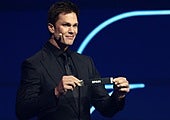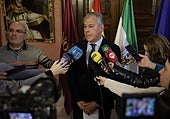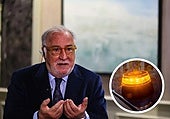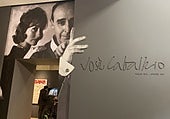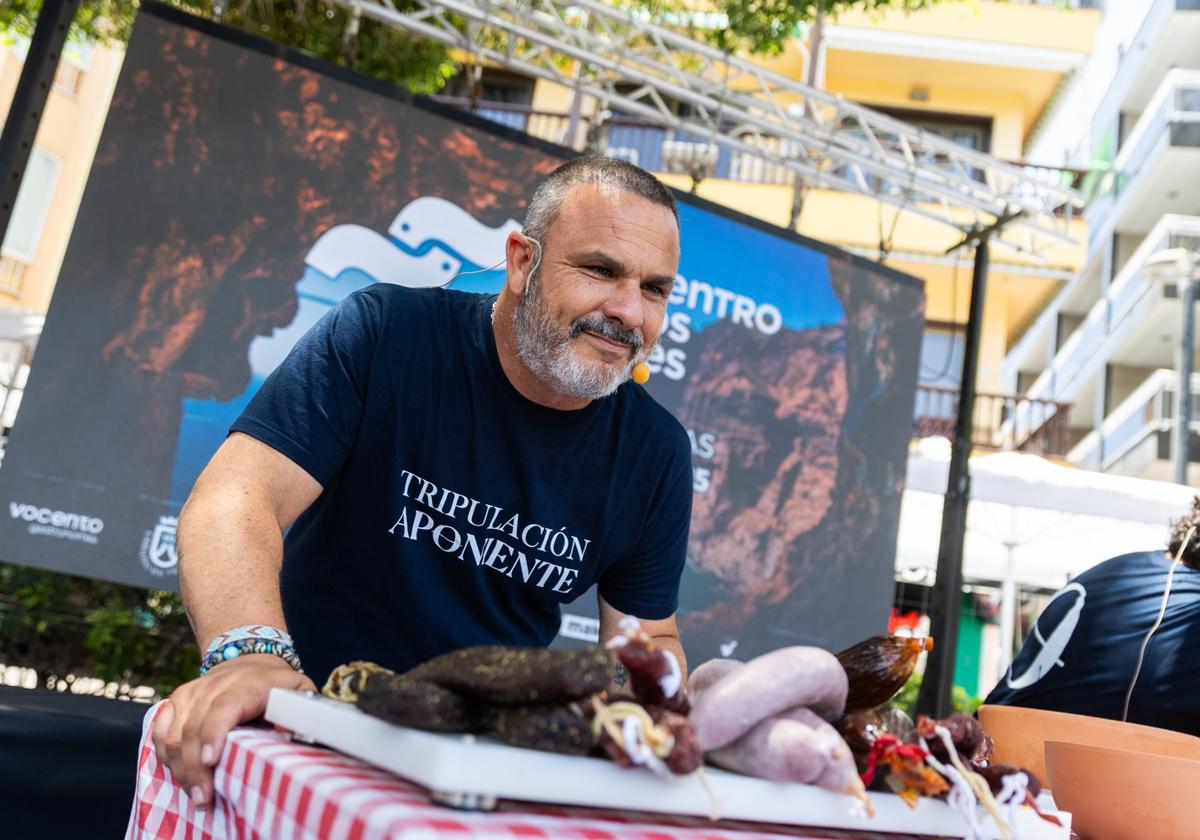Ángel León's Culinary Vision Expands Beyond Aponiente into the Marshlands
The 'Chef of the Sea' unveils his most ambitious project at the Encuentro de los Mares: constructing a fish farm to supply his pantry and support his research lines.
Guillermo Elejabeitia
Tenerife
Monday, 30 June 2025, 18:05
A chef sometimes doesn't need to invent a new dish to revolutionise his kitchen. Returning to the roots can be enough. At the opening day of the Encuentro de los Mares, held in Tenerife, Ángel León announced that the great innovation for Aponiente's upcoming season is not an unexpected ingredient or a new technique, but a project that will extend the boundaries of his restaurant across the 20 hectares of marshland surrounding it. This involves the complete restoration of the environment that inspires and nourishes his cuisine in El Puerto de Santa María, with the construction of a '3.0 fish farm' designed not only as an ecosystem but as a sensory, scientific, and gastronomic experience.
León, who had spent over a decade trying to secure the concession to manage these lands, admits he had begun to feel "bored," as if Aponiente had already told all it could. Until the marshlands rescued him. "It's a project that takes me out of my comfort zone," he acknowledged to the audience gathered on the beach at Bahía Beach in Arona. The plans include five-metre-deep channels to stimulate internal currents, allow the breeding of more species, and naturally reproduce the flows of marine life.
But the goal is not just to generate product. It's to generate awareness. And this aligns with the spirit of the Encuentro de los Mares, now in its seventh edition. The new ecosystem, from which all the fish served at Aponiente will be sourced, aims to invite diners to reflect directly on the life and death of the animal they consume. "We want them to live the experience: in less than five minutes, the fish you see swimming ends up on your plate," says the chef, who envisions the customer enjoying this fish while listening to Paco de Lucía and sipping manzanilla. An aquaculture without antibiotics or stress for the fish, which is nothing like industrial systems. "The fish farm is a spa for the fish," he jokes.
With this proposal, León not only multiplies his already pioneering vision of the sea as a great pantry of the future—here, marine cereal or sea soy, which he presented years ago, will finally grow—but also opens a new stage of territorial involvement. "We will go from 72 to 88 payrolls," he details, aware that this is not just a culinary project but also one of rural, environmental, and cultural development. He has learned from Juan, a wise man of the El Boli fish farms, from whom he has been absorbing techniques such as salting fish from the gills before roasting them over sapina, a halophyte plant.
Salt Against the Blackout
The other major figure of the day was oceanographer Carlos Duarte, the scientific director of the congress and one of the most insightful voices on the future of the sea. He focused his talk on salt, a raw material that this edition highlights as a symbol of a new awareness of resources. "For centuries, it was more valuable than gold, and we are rediscovering why," he stated, after reviewing the more than 14,000 documented uses of salt—10,000 of them in cooking—and highlighting its health benefits, from cholesterol regulation to improving sleep or skin diseases.
Duarte went beyond the human body to discuss the energy and climate uses of salt, with examples like the solar plants in Atacama, Chile, which store heat in molten salt tanks to generate electricity even at night. "Had we had this infrastructure, the recent blackout that affected the entire Peninsula could have been avoided," he assured. He also spoke about salt as a stabiliser for electrical grids, as an element to produce hydrogen or extract lithium from the sea without resorting to destructive mining. And as a construction material capable of absorbing CO₂.
"The sea is not just a landscape to look at or a product to eat; it's an opportunity to rethink everything," warned Benjamín Lana, director of Vocento Gastronomía and captain of this congress, which for seven years has been committed to uniting science, cuisine, and sustainability. In an edition marked by a more activist tone than ever—following the recent failure of the ocean summit in Nice—the message is clear: there is still hope if we work together. As Dimple Melwani, CEO of Tenerife Tourism, reminded us, "this congress places us in a more authentic tourism model, where traditions, the sea, and scientific knowledge intertwine." In times of urgent solutions, Ángel León's futuristic fish farm and Carlos Duarte's salt as energy are not anecdotes but hints of a new path. One that, with luck, we are still in time to tread.
"The Grill Doesn't Change, But Everything Else Does"
When the team from the Gipuzkoan restaurant Elkano landed in Cádiz to launch Cataria, they didn't open a branch; they opened a conversation between the north and the south that is proving most fruitful. The ingredients from one sea and another couldn't be the same, but they share the technique—the fire—and above all, an attitude of listening to the environment and the people who know it best. This relationship of trust and respect that Aitor Arregi strives to weave both in Getaria and in the Bay of Cádiz has earned him this time the Sartún award, with which the Encuentro de los Mares annually honours figures from science or gastronomy who serve as inspiring examples.
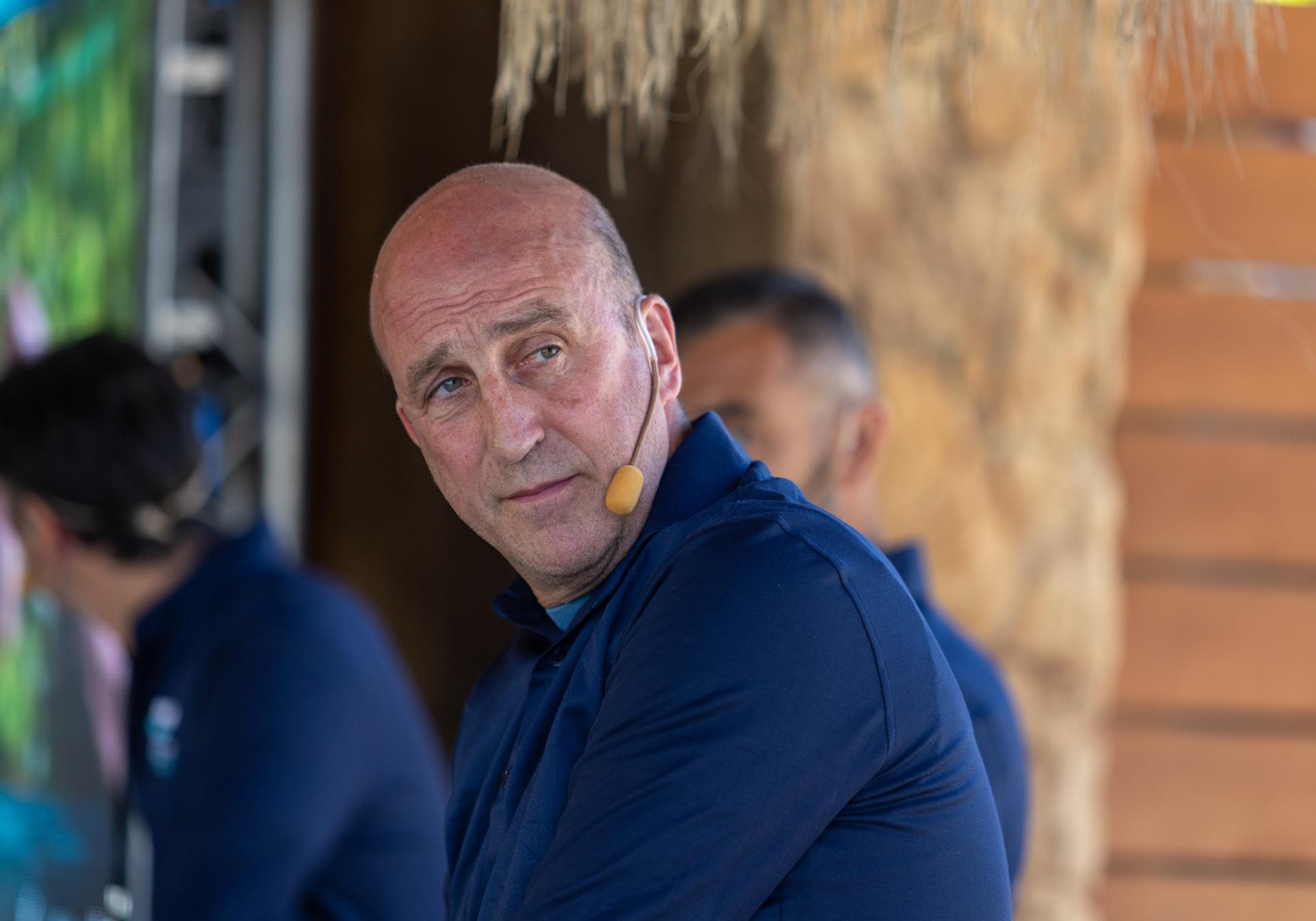
"We wanted to know the territory, not just the product," said Arregi, accompanied by his lieutenant Pablo Vicari. To do so, they counted from the beginning on Emilio Marín, a local fisherman, who guided them in understanding the environment: sea anemones, moray eels, red mullets. Learning to look at that sea was an essential step before lighting the coals. "The first cook is the sailor," Arregi recalled. And with that premise, Cataria has been building its own language in which the fire does not impose itself but listens. "The grill is the same, but everything else changes: the fish, the time, the water, the wind," he said. Vicari summed it up: "Cataria wouldn't make sense if we couldn't learn."
